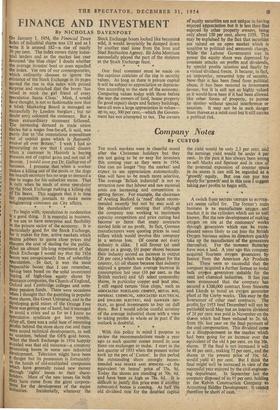FINANCE AND INVESTMENT
By NICHOLAS
DAVENPORT
ON January 1, 1954, the Financial Times Index of industrial shares was 131 and as I Write it is around 182—a rise of nearly 39 per cent. The index covers thirty indus- trial leaders and as the market last year favoured 'the blue chips' I doubt whether the average investor beat or even equalled the index. Yet one of our contemporaries, Which ordinarily chooses to ignore the existence of the Stock Exchange in its pages quoted the rise in this index with pained surprise and remarked that the boom 'has robed in mink the girl friend of every Speculative Santa Claus.' Mink, I would have thought, is not so fashionable now that a Mink Marketing Board is managed so successfully by London burglars ; but no doubt envy coloured the comment. But a More extraordinary statement followed. The increasing demand in trade union circles for a wages free-for-all, it said, was Partly due to 'the ostentatious expenditure Out of capital gains which is flagrantly evident all over Britain.' I wish I had so Penetrating an eye that I could discern When a customer in Harrods is buying Presents out of capital gains and not out of income. I would soon put Dr. Gallup out of business. I presume that when a worker makes a killing out of the pools or the dogs his branch secretary has no urge to demand a rise in wages for his unluckier mates. That
only when he reads of some speculator Cn the Stock Exchange making a killing out Of De Beers. This suggests that it is time for responsible journals to make more enlightening comment on City affairs.
To begin with, speculation in moderation Is a good thing. It is essential in business, if we are to have enterprise and flexibility in the private sector of the economy. It is Particularly good for the Stock Exchange, for it makes for free, active markets which enable jobbers to quote close prices and Cheapen the cost of dealing for the public. After an almost life-long experience of the Stock Exchange I would say that the 1954 boom was conspicuously free of unhealthy sPeculation. In fact, it was the most ,respectable boom that I can remember, having been based on the solid investment buying of high-class equity shares by Insurance companies, the Church of England, Oxford and Cambridge colleges and com- Pany pension funds. There were occasions When I thought that the gambling in popular store shares, like Great Universal, and in the developing gold mines of the Orange Free State was getting out of hand, but it managed M avoid a crisis and as far as I know no sPeculative syndicate got into trouble. Alter all, there was a solid base of mounting Profits behind the store share rise and there Were sound technical developments, as well as uranium, behind the OFS gold boom. What the Stock Exchange in 1954 happily avoided was that old nuisance—a company Promoting boom in some new industrial development. Television might have been a. danger but its promotion is fortunately In the hands of old-established companies Which have generally raised new money through 'rights' issues to their share- holders. Most of the new issues (in bulk lize) have come from the giant corpora- Iiilees for the development of the major
Stock Exchange boom looked like becoming wild, it would invariably be damped down by another steel issue from the Iron and Steel Realisation Agency. Sir John Morrison successfully played the part of the skeleton at the Stock Exchange feast.
• One final comment must be made on the captious criticism of the rise in security values. As long as there is private capital It will be subject to appreciation or deprecia- tion according to the state of the economy. Comparing values today with those before the war the owners of land, house property (in good repair) shops and factory buildings, have all won a large appreciation in values— up to, say, 300 per cent.—which the Govern- ment has not attempted to tax. The owners of equity securities are not unique in having enjoyed appreciation but it is less than that enjoyed by other property owners, being only about 150 per cent. above 1939. This may be explained by the fact that securities are valued on an open market which is sensitive to political and economic change, While the Labour Government was in power the equity share was depressed by constant attacks on profits and dividends, by special profits taxation and finally by a virtual dividend freeze. It became, in fact, an unpopular, unwanted type of security. Now that it has been freed from political abuse, it has been restored to investment. favour, but it is still not as highly valued as it would have been if it had been allowed like other forms of property, to pursue its destiny without special interference or taxation. It may not be in such danger from thieves as a mink coat but it still carries a political risk.


























 Previous page
Previous page